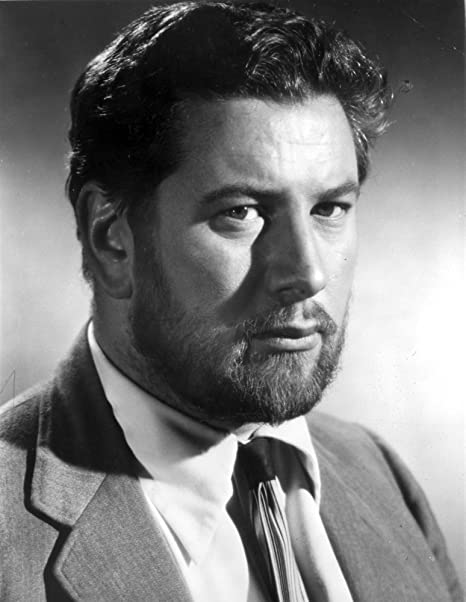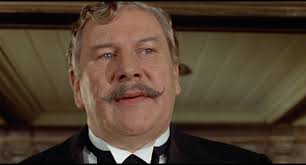100 years ago today was born that very deep well known as Peter Ustinov (Sir Peter Alexander Frieherr von Ustinov, 1921-2004).
When I was a kid, I knew Ustinov vaguely (from talk shows and the like) as an actor with a reputation for a facility with languages and dialects, and for being funny — he often played doughy, shifty-eyed quislings. He excelled at langorous, lounging guys in togas and pith helmets and fezes. I knew few (if any) of his actual movie roles back then (the 1970s) and only gradually became aware of his body of work over the decades. He’s not in many movies you’d call lasting classics, and there is a lack of consistency to his body of work (as he jumped between lead and supporting roles, the director’s chair, and the typewriter). I associate him especially with international caper and spy stories, usually with a comical element, and with him often cast, often as not, in wildly divergent nationalities and ethnicities. What you eventually learn when you explore Ustinov’s life in earnest is that his real identity was easily as fascinating as any role he could ever hope to play; many of his roles, no matter how exotic, no matter what ethnicity, seemed comparable to who he actually was. It’s entirely possible that he would achieved his knighthood without having been an actor at all, in fact.
On both sides of his family, Ustinov came from a long line of international adventurers, aristocrats and artists. While he was born and raised in England, his ancestry was Russian, German, Polish, Jewish (in both the German and Polish lines), French, Italian, and Ethiopian. He spoke English, French, German, Russian, Italian, and Spanish fluently; and a smattering of other languages partially.
His interest in the theatrical arts comes from his mother’s side. His mother was Nadezhda Leontievna Benois, a painter and ballet designer whose uncle, artist and critic Alexandre Benois, designed sets for Diaghelev and the Ballets Russes. Her father, Leon Benois, was a second generation Imperial Russian architect who built numerous important structures and monuments prior to the Communist Revolution, served as dean of the Imperial Academy of Arts, and was owner of the Da Vinci painting Madonna and Child with Flowers, which became known as the Benois Madonna. The founder of the impressive family was Jules-César Benois, a confectioner who fled the French Revolution in 1794 and became chef to Emporer Paul I of Russia.
Ustinov’s father was Jona Freiherr von Ustinov, a naturalized English journalist and spy for MI5 in Nazi Germany. The Ustinov dynasty begins with Peter’s great-great grandfather Andrianovich Mikhail Ustinov (1855-1836), a Russian wine merchant, who became one of the wealthiest men of the Lower Volga. Things get really complicated with his grandson (Peter’s grandfather), Plato Von Ustinov, who moved from Russia to Jaffa, Palestine (then part of the Ottoman Empire) for his health. Through his first wife, he became a naturalized citizen of the Kingdom of Württembergl (now part of Germany). His second wife (Peter’s grandmother), Magdalena Hall, was the daughter of Moritz Hall, a Polish Jew who became a Christian Missionary in Ethopia. Her mother was Wälättä (Katarina) Iyäsus Zander, an Ethiopian-German. She was descended from German painter Eduard Zander and the Ethiopian aristocrat Court-Lady Isette-Werq in Gondar.
This was the crazy lineage of Peter Ustinov, and I’ve simplified it. At any rate, Ustinov had a reputation for being a precocious genius, and he became a professional stage actor when still a teenager, after studying at the London Theatre Studio. He served with the rank of private during the war, mostly taking part in making propaganda films. A notable effort from this period was the 1944 film The Way Ahead, directed by Carol Reed and starring David Niven, co-written by Ustinov, who also appeared in the film. He was only 23 years old at the time.
I especially associate Ustinov with Roman/Biblical type movies, because they are among his best known films, though there are just a handful of them: the 1951 remake of Quo Vaudis?, The Egyptian (1954), Spartacus (1960), and Jesus of Nazareth (1977). Some of his better known earlier films included We’re No Angels (1955) with Humphrey Bogart and Aldo Ray, and the Kangraoo western The Sundowners (1960) with Robert Mitchum and Deborah Kerr. Ustinov wrote and directed the films Romanoff and Juliet (1961, probably his best known original script) and the Melville adaptation Billy Budd (1962). He was a circus ringmaster in Max Ophuls’ bio-pic Lola Montes (1955). He’s memorable in the caper film Topkapi (1964) and William Peter Blatty’s John Goldfarb Please Come Home (1965), in which he played an Arab Sheik. He wrote, directed, and acted in a comedy called Lady L (1965) starring Sophia Loren, Paul Newman, and David Niven. He was in Graham Greene’s The Comedians in 1967 with Richard Burton and Elizabeth Taylor; he later directed the pair in Hammersmith is Out (1972), based on the Faust story. For Walt Disney he appeared in Blackbeard’s Ghost (1968, as the title character), Robin Hood (1973, voices of King John and King Richard) and One of Our Dinosaurs is Missing (1975, an apparent play on one of his first films, One of Our Planes is Missing). In 1968 he co-starred with Maggie Smith in the all-star caper film Hot Millions, which he’d also co-written; the following year he starred in the wacky all-star comedy Viva Max (1969) in which he played an insane Mexican general who wants to remake the Alamo. He is also well-known for playing the Old Man in the 1976 sci-fi film Logan’s Run and for being in Marty Feldman’s The Last Remake of Beau Geste (1977).
The role Ustinov was most closely associated with over the longest period was that of Agatha Christie’s Belgian detective Hercule Poirot, which he played on six occasions, in Death on the Nile (1982), Evil Under the Sun (1982), Thirteen at Dinner (1985), Dead Man’s Folly (1986), Murder in Three Acts (1986), and Appointment with Death (1988). He is easily my favorite Poirot! During these years he also appeared in two related films for Clive Donner, as the title character in Charlie Chan and the Curse of the Dragon Queen (1981, somehwat unfortunate — we note that Peter Sellers appeared as Fu Manchu around the same time), and a 1978 remake of The Thief of Bagdad.
From 1991 to 2004, Ustinov was President of the World Federalist Movement, and he worked less in films during those years. In addition to dozens of books penned by Ustinov throughout his life (both fiction and non-fictions), scores of movie roles we haven’t mentioned, and as many documentaries he narrated or otherwise participated in, he was very much involved in world political affairs — in essence, given his inheritance, it can be considered his true work in life, with movies as a kind of sideline. He was also a popular guest on television talk and variety shows , like those of Steve Allen, Jack Paar, Danny Kaye, David Frost, Dick Cavett, Johnny Carson, Merv Griffin, Dinah Shore, etc. His presence on these programs was not unlike that of Orson Welles — an entertaining raconteur, more sophisticated than his surroundings, but willing to play the game because that was how things were done in the 20th century. What a weird time — where a man of real importance must seem to be less important in order to be important enough to take part in the most trivial charade in history. That’s show biz!
For more on show business history, including tv variety, please see No Applause, Just Throw Money: The Book That Made Vaudeville Famous,



You must be logged in to post a comment.